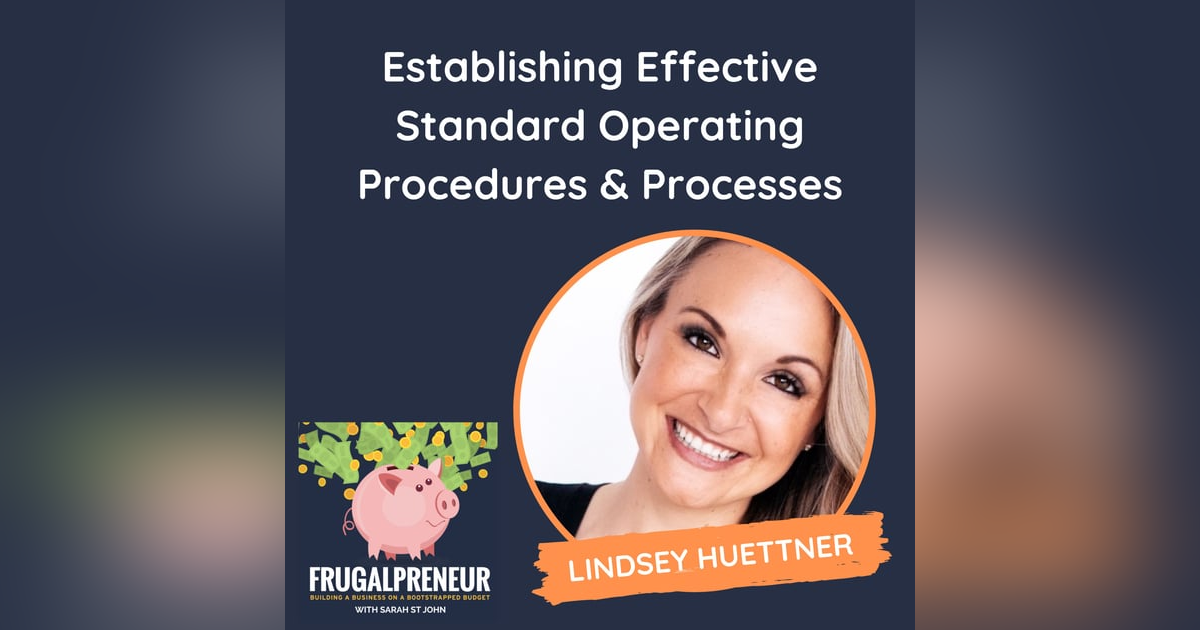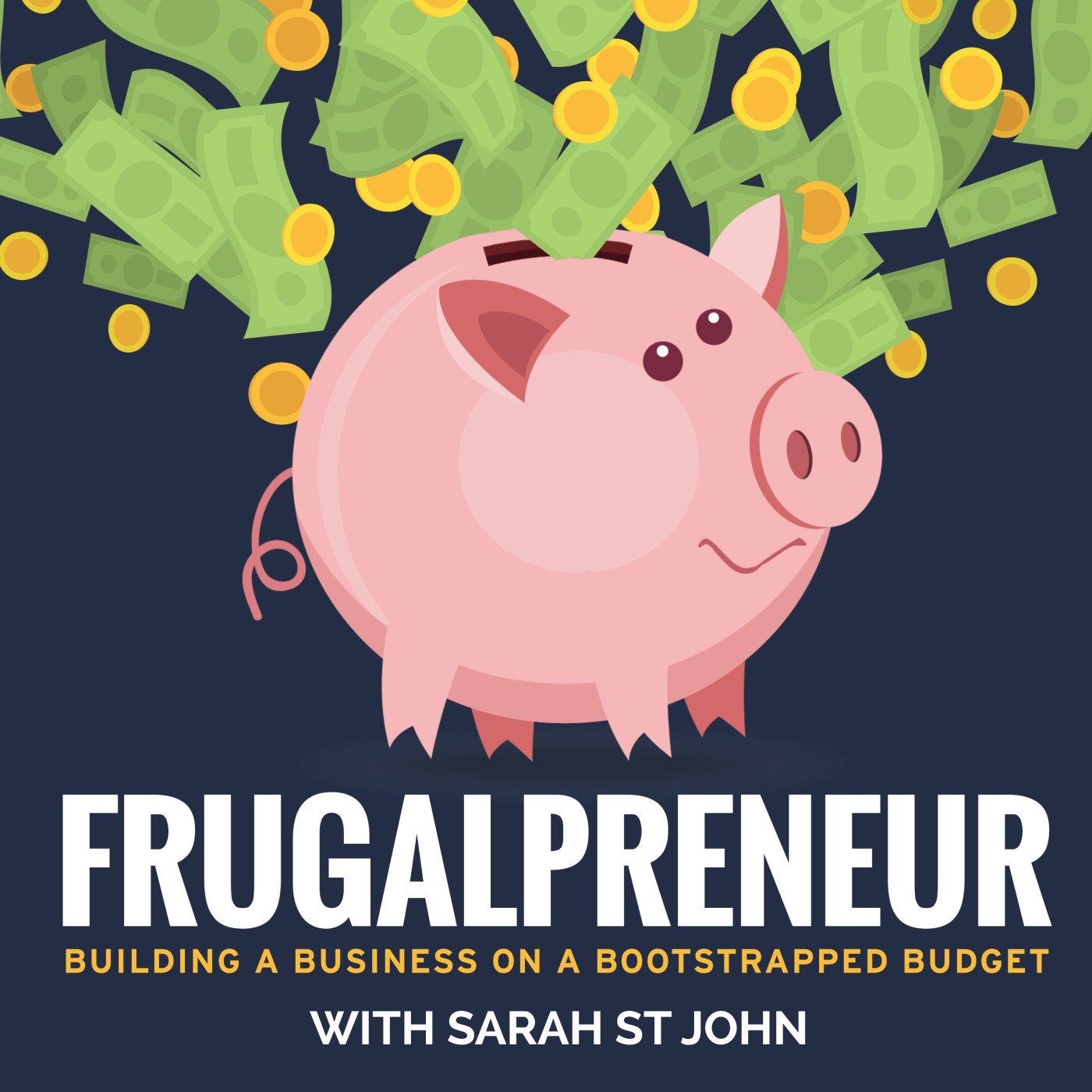Establishing Effective Standard Operating Procedures & Processes (with Lindsey Huettner)

This podcast episode serves as a compelling showcase of the entrepreneurial journey, wherein a seasoned bootstrapped entrepreneur (Lindsey Huettner) shares invaluable insights and strategies pertinent to the art of launching a business with minimal financial resources. The discourse elucidates the importance of maintaining a lean operational model, emphasizing the necessity of judicious spending and the implementation of efficient processes to augment productivity while minimizing costs. A particular focus is placed on the significance of project management tools, which, despite their initial expense, can yield substantial long-term benefits by enhancing organizational efficacy. Furthermore, the conversation explores various budgetary strategies, including the practice of scrutinizing expenditures regularly to eliminate unnecessary costs, thereby fostering a more sustainable business environment. Ultimately, the episode aspires to impart actionable takeaways that aspiring entrepreneurs can readily apply to their own ventures, facilitating their journey toward success.
A pivotal theme that emerges is the management of recurring revenue, particularly in relation to software subscriptions, which can pose a significant financial challenge if not approached judiciously. Lindsey illustrates this concept through the lens of the 'toilet paper method,' a metaphor that encapsulates the necessity for creative problem-solving when resources are constrained. By limiting financial resources, entrepreneurs are often driven to innovate, leading to the development of unique solutions that might otherwise remain undiscovered. This perspective invites listeners to embrace a mindset of frugality, championing the idea that constraints can serve as catalysts for creativity and ingenuity.
Additionally, the episode underscores the necessity of establishing robust processes within a business framework. Lindsey recounts their experience with project management software, initially viewed as an unnecessary expense, which ultimately transformed their operational efficiency. The conversation culminates in a call to action for listeners to critically evaluate their own business practices, encouraging them to adopt the strategies discussed and apply them within their entrepreneurial endeavors. Sarah St. John concludes the episode by reinforcing the notion that the insights shared by the guest can serve as invaluable tools for aspiring entrepreneurs, empowering them to navigate the complexities of business ownership with confidence and acumen.
Takeaways:
- The episode emphasizes the importance of bootstrapping, outlining strategies for financial efficiency in business operations.
- Listeners are encouraged to implement project management tools to enhance productivity and organizational effectiveness.
- The podcast discusses the significance of maintaining lean operations to minimize unnecessary expenses and maximize resources.
- A recurring theme is the need for well-documented processes to facilitate efficient onboarding and task execution in growing businesses.
- Lindsey highlights the value of regularly reviewing and cutting unnecessary budget items to maintain financial health.
- Utilizing shared office spaces or resources can significantly reduce overhead costs while maintaining professionalism in business interactions.
Relevant Links:
00:00 - Untitled
00:44 - Untitled
01:18 - Starting a New Chapter in Bootstrapping
01:20 - The Entrepreneurial Journey Begins
03:34 - Managing Costs in Business Operations
05:53 - Bootstrapping Strategies for Entrepreneurs
07:48 - The Importance of Processes in Business
Welcome to the Frugalpreneur podcast. I am your host, Sarah St. John.This episode is what I refer to as a showcase episode where I feature a bootstrapped entrepreneur and they briefly share their tips, tricks, tactics, techniques, and tools that help them bootstrap their business and the successes and failures along the way.My hope is that each of these showcase episodes will provide at least one valuable takeaway that you can implement with right away in your own bootstrap business journey. Now onto the episode.
Lindsey HuettnerI have always had an entrepreneurial bug. To me, I'm actually on my sixth business and I don't know why that started.My parents weren't entrepreneurs, but when I was younger, I was told that I needed to go make money so I could either babysit or you could pet sit. And in the very beginning, I, I liked pet sitting better. So I decided that that would be something that I would do.And then I started thinking, how can I do that better? So. So because of that, that business started to grow. Over the years, I would sell and then start new businesses.Up until the time that I now have the marketing agency. We're a full service agency.We'll go into companies that either already have a marketing department in house or will come in and take over absolutely everything that they need.I'm not sure what made me start businesses, but it's always been in my blood and always something that I probably was just going to be a really bad employee with how I was as a child. So it's probably better that I became the person to fend for themselves and be entrepreneurial.When you start a business, the goal, at least for me, was to do absolutely everything that I possibly could myself in order to make sure that I wasn't paying other people.One of the things that is now so prevalent in pretty much any business is the reoccurring revenue of software, which, if you're not careful with that, it will eat you alive. So making sure that everything stays as lean as you possibly can. Do you need an office space? Maybe? Do you not need an office space? Maybe.How can you get your labor less expensive? Can you outsource it? Can you have somebody that moonlights for you so this is not their main point of their salary or their main point of income?If, is there something that you can do overseas?Can you piggyback on another company to help you with things so you're not having to pay salaries and then just really making sure and looking at your budget and go, okay, this is the most amount that I can spend on Anything and then working within that. So there is something called the toilet paper method. It is a book, you can go ahead and you can read it.And the premise of that is when you have a lot of toilet paper, you use a lot of toilet paper and when you have one sheet left, you get really creative of how to use that one sheet or zero sheets. And so it's the same sort of premise.If you really give yourself a hard line of this is how much I'm going to spend, you get really creative of how to spend that money and then also how not to spend that money. The book that I'm referencing is, I believe it's called Pay Yourself First. So I highly suggest it. Being a business is the quality.If you bootstrap absolutely everything, then sometimes your quality lacks because of it. So it's definitely a cart before the horse. It's also a balancing act of do I really need that?Will it make my product or my service more professional? If I have that or if I have an office or that software. Another thing is processes, processes, processes. So do you have a project management software?That was one of the biggest things in the very beginning of the agency is I knew that we needed a project management software and we would actually try to find the least expensive project management softwares.And about four years into the business I finally bit the bullet and got more expensive project management software and then also had a company come in and implement it for us, which was terrifying because it was so expensive. But it was the best thing that I have ever done for my business. So definitely weigh is this going to help me in the long run?And if it is, if it's going to help me have a better product, be more productive, be more organized, then I say go for it. If it's something that's frivolous, like I need this extra software because it sends emails and I just don't want to send the emails.It's something like that. I would really look into it and go, okay, is this something that I absolutely have to have?Do I have to have the corner office or can I work in a coffee shop? Do I have to have a co working space or can I find somebody that is out there that already has a space and isn't in there three days a week?There's all kinds of things that you can do around bootstrapping. One of the things that I talked about earlier was a project management software. So we use ClickUp and that has been the best thing.Even though it is a little bit more expensive, it Also has saved us so much time and money. Because of that other tips and tactics and techniques that I have for bootstrapping.So for us, our bank actually allows, and I think that other banks are starting to come on board with this. They actually allow people or entrepreneurs to go in and use their offices.So that is a really good technique if you have to have a meeting or if you need a professional background because you're having zoom calls. Being able to do that as opposed to needing to have an office space, which has worked out really, really well for us in the beginning.That book that I told you about earlier, that was really transformational for me because they talk about creating different bank accounts and just like when you were younger and you had different envelopes that you would put your money in, tithing and spending and saving and bills if you had that, it's very similar to that. So that has been a really, really good help for us as we have moved along this business.And then also one thing that I did when Covid hit was I went through and I just seriously slashed absolutely everything from our budget that we could. And I loved that.Well, I hated it at the time, but now I do that every single year is really look at what we've spent our money on and just slash the things that we don't need to spend money on.If you don't do that regularly, then you'll see by the end of the day or the very first time that you ever look at it that there are so many things within your line items that you really don't need. One thing I talked about were processes, processes, processes.And I am so passionate about this because one, it'll allow you to stay frugal and bootstrap your company.The reason why is because if you do ever need to bring somebody on board and you have a process, and that's well documented, you are not spending money and time having to teach that person how to do the tasks that you need them to do. So actually we help companies that have marketing, internal or that want to do their own marketing. We have SOPs of the month.And so these are literal step by steps of how to do different tasks within marketing. They are completely free.You just have to sign up for our monthly newsletter and you'll get access to all of those that will save you so much time and having to create those own processes for yourself.But then also, again, you will reap the benefits of when you do have somebody come on board to help you with your company to be able to show them the process, give them the documents, and then let them run with it.
Sarah St JohnI hope you enjoyed that episode and were able to take away a valuable nugget of information that you can implement right away in your own business. If you feel your story would be valuable for the listeners of this show, please visit Frugal show guests.








